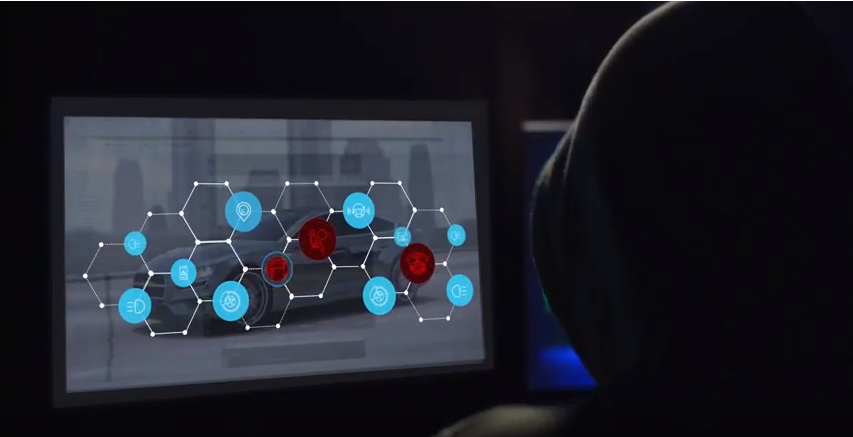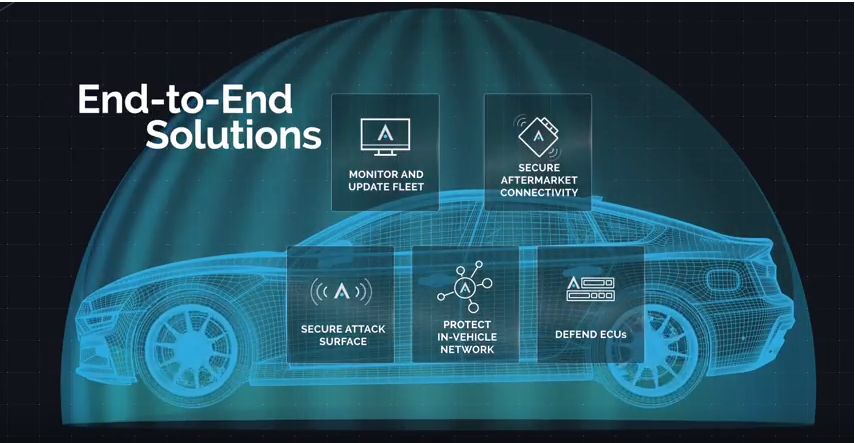Your future digital vehicle will recognize you and even know what you want, all in order to serve you in ways that are unimaginable today. On route to this new era, VocalZoom is developing an optic sensor that isolates background noise and improves the voice activation experience. At the same time, Argus is building sophisticated software to combat scenarios of digital takeover.
“Imagine that you will be able to ask your vehicle to pay for parking, to provide information about the things you see during a trip, to reserve a table at a restaurant, and to access your bank account”, suggests Tal Bakish, CEO of VocalZoom. “Professionals argue as to whether it will happen in another five or ten years, but it’s clear to everyone that this is where we are headed. Actually, some of the services already exist today through a call center or by means of voice activation-based systems in vehicles that are connected to the internet (connected cars).”
In order to fulfill the desire to make money from the future services and information provided by our car, most of the automotive companies have agreed on the importance of a voice-based personal assistant. Such an “assistant” will allow us to talk to the vehicle and transfer large amounts of information, not just instructions.
“This is a very broad strategy and, motor companies are investing extensive effort in order to transform it into reality due to its numerous advantages”, Bakish explains. “Among others, it enables the provision of more services to the drivers, including faster purchase and sale of goods and services. The supply of information and services that has been so successful in mobile telephones, will also be present in motor vehicles, but certain conditions are needed in order for this to happen. It’s important to remember for example, that customer identity is an unresolved problem in the automotive industry and that we need to know who is sitting in the vehicle in order to tailor the services and advertising to them.”
“Implementing this strategy requires a voice interface that will enable identification of the driver’s voice. We want to allow the machines or motor vehicles to understand people better, to identify them, and to discover what they want. This understanding doesn’t only include comprehending the words, but also understanding context, so that the vehicle will know whether I am talking to it or to the child in the back seat.”
“Currently, the field of voice activation in motor vehicles is faltering. The systems don’t operate well enough therefore their use is limited. This is exactly where VocalZoom comes into the picture. Our innovative development is an optic sensor that identifies voice instructions in a noisy environment and is aimed at providing voice identification and vocal command solutions for motor vehicles.”
“VocalZoom was founded in 2010 and began its operation within the framework of the ‘Maayan Ventures’ technological incubator”, Bakish explains. “The technology that we have developed is based on a combination of an acoustic and optic sensor, directed at the speaker, enabling the isolation of background noises. Our first product, that reached the market a few months ago, is a helmet microphone and two-way radio, intended for the search and rescue market – firefighters, and police personnel, that will serve professional teams in noisy environments. Our product’s next generation will focus on motor vehicles and we intend for this to be our central market.”
“The performance of our sensors’ voice activation and voice identification is better and more precise than existing solutions. This will help automotive companies create a situation whereby more people will adopt this technology. The distinguishing factor between a good company and its competitors will be the quality and efficiency of its voice activation’s user experience. High quality activation will be an indicator of prestige. As a result, our technology will be installed in the high-end vehicles first.”
“We achieve better performance by means of a small, cheap, laser-based sensor that also measures a person’s movement and the very small vibrations of his facial skin while talking. The sensor transforms these vibrations into voice and, according to the facial skin vibrations can understand what that person is saying.”
Our sensor can be placed in the seats, the ceiling or on the vehicle’s mirror where it enables us to isolate the driver’s voice instructions in order to enhance comfort, safety and driving experience. Because it’s an extremely sophisticated sensor that measures things at high resolution and wide range, it serves as a multi-purpose tool capable of performing multiple tasks simultaneously and, in essence, constitutes human-to-machine voice communication.”
“Our vision is to talk with the vehicle”, Bakish summarizes. “This is a decades-long dream. We saw it on television programs, but in just a few years’ time it will be part of our lives.”
Cyber Warriors
In Greek mythology, Argus was a hundred-eyed giant. The Israeli startup company that bears its name was founded in 2013 by three graduates of the military Unit 8200 and Zohar Zisapel. Much like the mythological creature, they want to watch over the digital vehicle with hundred eyes.
“When the founders analyzed the world of cyber security, they understood that there would be a critical need for motor vehicle cyber security and that there are no major players in this market”, says Yoni Heilbronn, Argus CMO. “Initially, car manufacturing executives regarded us suspiciously. Today, no one is surprised because now, the whole world realizes the significant need for solutions to this problem.”
“In many ways, we needed to create the market and explain why cyber security was necessary for motor vehicles. The global automotive industry is a difficult one with long development and sales’ cycles. After all, a motor vehicle is a fast-moving box with people inside – and deliberate sabotage can therefore have a direct impact on human lives. That is also the reason for the enormous market potential.”

Recently, Argus received a financial grant as part of the “Horizon 2020” program, managed in Israel by ISERD at the Israel Innovation Authority. Heilbronn tells about the program: “This is an interesting platform because it involves relevant players from the industry itself. European companies have high regard for collaborations with academia and industry which lie at the foundation of this field, and view it as a source of innovation and a friendly way to advance knowledge. Participation at this program also included the creation of interactions that we would not necessarily achieved otherwise. ISERD is engaged in a much welcome and praiseworthy work, even if it is not always carried out with a high media profile.”
“We are currently working with most of the world’s automotive manufacturers and their sub-suppliers in assimilating solutions. Over the last two years we have developed partnerships with key players in the industry and with almost all the chip manufacturers. We collaborate with mega companies such as Qualcomm, Check Point and many others. Maintaining such high-profile collaborations is not an obvious achievement.”
“Over the last decade, a significant portion of the new cars have been connected to the internet with embedded internet connectivity and hundreds of millions of vehicles will be connected to the web by 2020. Once these vehicles, that are in practice ‘computers on wheels’, are connected to the internet – they become susceptive to hacking. The possible scenarios are endless: from crimes, such as ransom, to terror. Ultimately, the vehicle’s internal communications network is based on a protocol that was invented more than 30 years ago, before the internet became relevant, and that’s problematic as far as security is concerned.”
“The acceleration in the field of motor vehicle connectivity is at its peak. For the manufacturers this is naturally a source of income from advertising and other services specifically tailored to the people in the car. Connectivity is one of the fundamental causes in the vehicles of the future becoming semi-autonomous and autonomous. If the cars will not be secure – we will find ourselves facing a global problem. Vehicle collision occurs even today but one can only imagine what may happen with hundreds of thousands of vehicles and millions of autonomous vehicles on the road – that is a much more dangerous situation.”
“Argus seeks to resolve this need for security with different layers of protection that locate attacks and prevent malicious takeover of critical systems such as the motor, brakes and steering. The company started out with a single product but we rapidly understood that there is no magic solution that suits everyone. This is due to the changes in the market, but also because different clients have different needs and because there is no single solution to the threat. We realized the need to develop additional technologies and have accordingly registered approximately forty patents thus far.”

“Around these patents we have constructed a package of multi-layered solutions for various scenarios in motor vehicle. These are software solutions assimilated by someone else’s hardware. They are capable of communicating with back-end platforms that are usually located in the cloud, but sometimes at the vehicle manufacturer’s servers and provide him information about his vehicles. The manufacturers are the ones promoting connectivity but they must ensure that operates in a safe and secure manner.”
“Because vehicle architecture today is global, protection is relevant for all vehicles of the same type. We need the capability to understand and analyze what is going on, to operate big-data algorithms and possibility send remote updates so that ultimately, cyber-attacks can be thwarted without a vehicle recall. The first recall in history directly related to a cyber-issue, occurred more than two years ago: American researchers simulated a remote system hack that threatened 1.4 million jeeps which led to a massive recall, the cost of which is estimated at more than 1 billion dollars.”
“The industry is beginning to be increasingly proactive and governments around the world are also realizing that there is a problem. This leads to legislation and regulation although to date there is no binding standard regarding the cyber defense systems required in a motor vehicle. The United States is leading the way and what happens there influences the whole world. Over recent months, we have witnessed rapid processes taking place in Congress aimed at passing a law obligating manufacturers to install systems such as ours that will monitor the vehicle and provide real time protection throughout its life span.”
“Our vision is to protect every connected vehicle in the world, and that is where we are headed”, Heilbronn concludes. “This is an exciting time and interesting place to be in from every perspective – both technologically and business-wise. We are expecting significant growth in our activity over the coming year and are planning an accelerated recruitment of employees, mainly in research and development positions.”
On November 3, 2017, Argus was sold to the major German motor company – Continental, and will continue to be an independent company under its subsidiary company Elektrobit. The deal, that constitutes a huge exit for the Argus team, serves as an impressive vote of confidence in the Israeli digital motor vehicle industry.
Tzachi Schnarch, the Authority’s CTO: “Israel is a leader in the field of vehicle’s sensors and surroundings’ awareness as well as in connectivity. In a vehicle that frees the human driver from the need to drive, there is paramount importance to user’s experience and the utilization of time saved. Solutions such as VocalZoom’s provide a response to this specific need. At the same time, once the vehicle’s surroundings digitize, it becomes more exposed to cyber-attacks and Israel is at the international forefront of vehicle cyber technology.”
